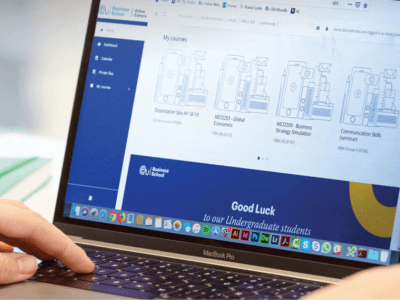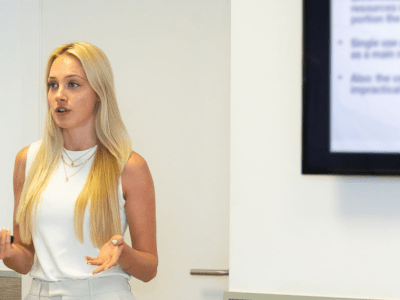#EULive – Business Post COVID-19
The world of business and work is in a state of flux. Technological change has reshaped the workplace over the last two centuries, but the speed with which automation technologies are developing today, and the scale at which they are disrupting the world of work, are without precedent.
A Conversation to Prepare for the Future
In an #EULive panel discussion hosted by Jon-Hans, the Academic Dean of our online campus, attendees gained insights into the future of business globally and the skills that would be needed to advance their career in this rapidly changing climate.
On the panel was entrepreneur Julian Baladurage, Co-Founder and CEO of end-to-end website as a service provider MBJ London. Julian has grown the company from just two people to a team of fifty spread across three continents. He was joined by legal consultant and researcher Alexandra Severino, who alongside teaching at EU, lectures at the United Nations Institute for Training and Research. The third and final panelist was eBusiness expert Manal Negmeldin, Head of Digital and Omnichannel at ELARBY, and Founder and CEO of E-Business School.
The fascinating panel discussion responded to audience to questions about what will come next in global business and how they can prepare for the new normal.
Here, we’ve consolidated the expert opinions of our panelists into predictions for what will come next and advice to help business leaders, entrepreneurs, students, graduates and jobseekers thrive in the post COVID-19 world.
What Will Business Look Like Post COVID-19?
- The new normal will be a distance economy, enabling us to cope with the continued presence of the virus. This provides fertile ground for new initiatives to emerge and claim shifting consumer attention.
- Digitalization has been accelerated by the necessity for employees to work remotely and for companies to transition to online business models. This will likely result in:
- An increase in remote and flexible working in the industries where that’s possible.
- Teleworking becoming enshrined in the legal codes of most companies.
- Incidences of hacking and spyware increasing, requiring more careful vigilance and better protective software.
- A rise in eBusiness and e-Learning – searches for both have increased dramatically in the past months (eBusiness by 80% and e-Learning by 200% according to panelist and eBusiness expert Manal Negmeldin).
- Laws and regulations will have to be updated to accommodate changes to the economy:
- Lawmakers must ensure workers’ rights remain protected in the new ways we are working.
- In countries such as Portugal and Germany, laws protecting workers make hiring and firing employees complex. Changes to the law will allow companies trying to get back on their feet to make more rapid decisions, thereby decreasing levels of unemployment. However, such changes will need to be accompanied by state support for people who lose their jobs, particularly as we will be entering a recession.
- Career paths and the skills in demand will change:
- The gig economy will grow: the new skills people have gained and enterprises that have been started during this time will result in more ‘portfolio careers’, which offer the flexibility and variety many have come to expect and appreciate.
- Skills that relate to the rising sectors of digital transformation, eCommerce, e-Learning, fintech and blockchain will be highly valued. Although some roles will become redundant, other new roles will emerge as markets shift.
- Companies will seek multi-skilled employees with a broader, rather than deeper expertise – people who are more able to be agile and flexible to changing business needs.
- Corporate Social Responsibility is expected to become more integral to the fabric of successful businesses. Consumers now have heightened expectations having seen how admirable companies have supported staff and local communities during this time.
- Perception of debt is changing. Many governments have had to take on heavy debt and economists are now suggesting this is fine as long as a country grows faster than its debt.
How to Thrive in the New Normal
Our panelists had valuable advice to share with business leaders and entrepreneurs:
- Use analytics to understand who is engaging with your product/service. Has your audience changed? Use the insights gained to:
- Inform decisions about the direction and shape your business should take.
- Inform your communications strategy. This should be amended to take into consideration how customers’ needs and desires have changed.
- Be open to change.
- Consider different ways of working – discover and keep the best aspects of how you’ve adapted over the past few months.
- Asses the suitability of your business model for this time and consider changing it if needed.

For students, graduates and jobseekers, the panel had the following words of wisdom to share:
- Make sure the qualities on your CV reflect what employers are looking for now:
- Demonstrate your flexibility, agility and creativity.
- Show you are willing and qualified to participate in the design of the business and important decisions about the shape it will take in the near to longer-term future.
- Remember, a broader skill set will be valuable to employers uncertain of exactly what they will need from their team in this extended period of flux.
- The job market will be challenging for a while. Consider using this time to gain valuable additional skills and knowledge that will make you more hirable. However, make sure you take a structured approach to online learning.
- First, decide on the career path you want to follow.
- Then, research courses carefully.
- Make sure you understand which qualifications will help you on your path and how.
- Check that the courses you’re interested in will be desirable to the companies you want to work with and are appropriate for the roles you’re pursuing.
Analyze, Reflect and Learn
Coronavirus has created a more complex environment that is prone to change. To thrive, we need to constantly adapt, learn and inform ourselves to stay relevant and create value that people will recognize. This is true both for businesses and employees.
The panelists at this #EULive event encouraged attendees to remain optimistic and to take advantage of the opportunity to reflect and move slowly, a precious commodity in a world which had been steadily gathering pace. Moving through this time and towards the new normal, we should be open to learning and to gathering useful insights that will support our personal and professional growth.
EU Business School can prepare you with the skills, practical experience and growth-mindset necessary to stand out in the business world of tomorrow. Our highly ranked programs will give you the knowledge you need to overcome business challenges caused by coronavirus, the accelerated pace of change and the hurdles still yet to come.










